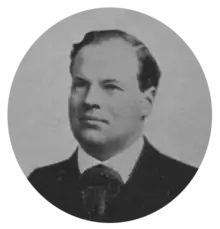The Earl of Feversham | |
|---|---|
 Duncombe from the Roll of Honour published in The Illustrated London News on 30 September 1916 | |
| Member of Parliament for Thirsk and Malton | |
| In office 1906–1915 | |
| Preceded by | Sir John Lawson |
| Succeeded by | Edmund Russborough Turton |
| Personal details | |
| Born | Charles William Reginald Duncombe 8 May 1879 |
| Died | 15 September 1916 (aged 37) |
| Political party | Conservative |
| Parent(s) | William Duncombe, Viscount Helmsley Lady Muriel Chetwynd-Talbot |
| Residence | Duncombe Park |
| Education | Eton College |
| Alma mater | Christ Church, Oxford |

Lieutenant-Colonel Charles William Reginald Duncombe, 2nd Earl of Feversham (8 May 1879 – 15 September 1916), known as Viscount Helmsley from 1881 to 1915, was a British Conservative Party politician and soldier.
Origins
Charles Duncombe was born on 8 May 1879, the son of William Duncombe, Viscount Helmsley, elder son of William Duncombe, 1st Earl of Feversham, and Lady Muriel Frances Louisa, daughter of Charles Chetwynd-Talbot, 19th Earl of Shrewsbury.[1] His father William, Viscount Helmsley, died in 1881,[2] and so the viscountcy thus passed to Charles Duncombe.
Duncombe was educated at Eton College and Christ Church, Oxford, gaining a blue in polo with OUPC.[3] He was also a member of Apollo University Lodge.[4]
Career
Duncombe was appointed an assistant private secretary (unpaid) to Lord Selborne, First Lord of the Admiralty, in June 1902.[5] He was elected as the Member of Parliament (MP) for Thirsk and Malton in 1906 and held the seat until he inherited his title on the death of his grandfather in 1915,[1][6] becoming a member of the House of Lords.
He was an outspoken opponent of women's suffrage;[7] a 1908 profile noted that he "is a very ardent adherent of any cause he espouses; indeed his keenness is one of the remarkable traits of his character ... fearless and outspoken in the expression of his views on all subjects".[2]
Military career
Duncombe joined the Yorkshire Hussars, and was promoted to Lieutenant on 21 May 1902,[8] rising to become Lieutenant Colonel before transferring as a battalion commander of the King's Royal Rifle Corps.[9]
He enlisted for active service in the First World War, and was killed in action on 15 September 1916 at the Battle of Flers-Courcelette, while commanding 21st Bn (Yeoman Rifles) King's Royal Rifle Corps. The battalion was formed in 1915 at Helmsley.
Richard Holmes makes that claim that Duncombe took his deerhound to war, and that it was killed and buried with him,[10] although this was refuted in 2014 by a young relative, who said that the dog survived, and was looked after by then Prime Minister, David Lloyd George, who was a great friend of Duncombe.[11]
Charles Duncombe, Lord Helmsley, lies in the AIF Burial Ground near the village of Flers on the Somme.[12]
Personal life
Duncombe married Lady Marjorie Blanche Eva Greville, daughter of Francis Greville, 5th Earl of Warwick, in 1904. They had two sons and one daughter:
- Lady Mary Diana Duncombe (1905–1943), who married Lt. William Greville Worthington of Kingston Russell.
- Charles Duncombe, 3rd Earl of Feversham (1906–1963), who also became a Conservative politician; he married Lady Anne Dorothy Wood, only daughter of Edward Wood, 1st Earl of Halifax and Lady Dorothy Onslow (a daughter of William Onslow, 4th Earl of Onslow), in 1936.
- Hon. David Duncombe (1910–1927), who was killed in a car accident in 1927, aged 17.
Duncombe lived at Duncombe Park and, when in London, at 87 Eaton Square.[9] He became master of the Sinnington Hunt in 1904.[2] He was a member of the Carlton Club, Turf Club, the Bachelors' Club and White's.[9][1]
Following his death, the Dowager Lady Feversham married the Conservative politician Gervase Beckett in 1917. She died in July 1964, aged 79.
Descendants
Through his daughter Diana, he was a grandfather of Capt. Charles William David Worthington (b. 1930) who married, as her second husband, Sara Stucley (youngest daughter of Sir Dennis Stucley, 5th Baronet).[13]
Through his son Charles, he was a grandfather of Lady Clarissa Duncombe (1938-2021), who married, as his second wife, Maj. Nicholas Spencer Compton Collin, of Wytherstone House, Pockley.[14]
References
- 1 2 3 "Members after 1832". membersafter1832.historyofparliamentonline.org. The History of Parliament. Retrieved 28 October 2023.
- 1 2 3 Mannin, Charles A. (1908). Yorkshire leaders; social and political. London, Queenhithe Print.
- ↑ https://web.archive.org/web/20141025122048/http://www.oxforduniversitypoloclub.com/index.php/archive. Archived from the original on 25 October 2014. Retrieved 10 August 2013.
{{cite web}}: Missing or empty|title=(help) - ↑ Oxford Freemasons, J Mordaunt Crook & J Daniel (2018), p.207
- ↑ "Court Circular". The Times. No. 36797. London. 18 June 1902. p. 12.
- ↑ "Peerages: of Feversham (Earldom)". peerages.historyofparliamentonline.org. Retrieved 28 October 2023.
- ↑ Hockenhull, Tom (2022). Kelleher, Richard (ed.). Defaced!: Money, Conflict, Protest. Fitzwilliam Museum. pp. 60–61. ISBN 978-1-913645-33-5.
- ↑ "No. 27435". The London Gazette. 20 May 1902. p. 3326.
- 1 2 3 Dod's Parliamentary Companion 1916. Dod's Parliamentary Companion. 1916. p. 52.
- ↑ Holmes, Richard (2004). Tommy : the British soldier on the Western Front, 1914-1918. London : HarperCollins. p. 627. ISBN 978-0-00-713751-0.
- ↑ Hooper, Colette (2014). Railways of the Great War with Michael Portillo. Transworld Publishers Ltd. ISBN 9780593074121.
- ↑ "Lieutenant Colonel Charles William Reginald Duncombe | War Casualty Details 264937". Commonwealth War Graves Commission. Retrieved 28 October 2023.
- ↑ Morris, Susan (20 April 2020). Debrett's Peerage and Baronetage 2019. eBook Partnership. p. 3524. ISBN 978-1-9997670-5-1. Retrieved 8 December 2023.
- ↑ Obituaries, Telegraph (13 August 2021). Lady Clarissa Collin, heiress to a North Yorkshire estate and authentic countrywoman who survived a bad riding accident and was totally committed to her civic duties – obituary. The Telegraph. Retrieved 8 December 2023.
{{cite book}}:|newspaper=ignored (help)CS1 maint: location missing publisher (link)